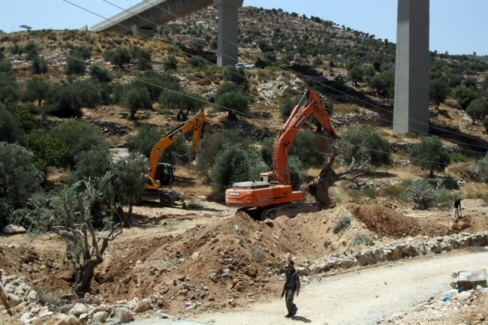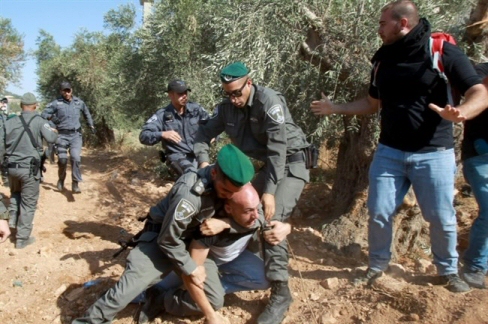Palestinian Christians clashed with Israeli border police near Bethlehem, Wednesday, after dozens of demonstrators, including priests, gathered to protest renewed work on Israel’s controversial apartheid wall in the Christian majority town of Beit Jala.An AFP journalist said the protesters, who were joined by a few foreign activists, gathered in Beit Jala to protest building a stretch of the wall, which started Monday, after years of legal battles.
The three Roman Catholic priests tried to pray among olive trees that bulldozers and mechanical diggers were seeking to uproot but were stopped by police.
One demonstrator was arrested as he tried to plant an olive sapling in front of the excavators.
Police wrestled with protesters who chanted, ‘Israel is a terrorist state. It doesn’t scare us.’
The EU missions in Jerusalem and Ramallah said they were ‘concerned’ about the beginning of construction work in Cremisan, noting that it will directly affect the livelihoods of 58 families.
Israel began building the separation wall with concrete walls, fences and barbed-wire inside the occupied West Bank in 2002 at the height of the second Palestinian Intifada, claiming the barrier was crucial for security.
The International Court of Justice ruled in 2004 that construction of the barrier was illegal and, like the UN General Assembly, demanded that it be dismantled.
Palestinians, who refer to its as the ‘apartheid wall,’ say the barrier is a land grab, pointing out that when complete, 85 percent of it will have been built inside the West Bank.
Related: Noam Chomsky: Israeli Apartheid ‘Much Worse’ Than South Africa
The wall has already completely cut off East Jerusalem from the rest of the West Bank.
The Applied Research Institute in Jerusalem says the wall will annex around 13 percent of the total area of the West Bank.
There has been fierce opposition from the local Palestinian Christian community, which has enlisted papal support, regardingthe area of the wall that approaches Beit Jala and the adjacent Cremisan Valley.
The case grabbed special attention when the wall was slated to separate Cremisan monastery from the neighboring convent and vineyards.
It would have also separated Palestinians in the nearby Christian village of Beit Jala from their olive groves.
Israel’s High Court ruled in April that the work must stop and told the government to consider alternative routes.
But, in a new decision on July 6, the court said work could go ahead, ruling that the previous ban referred only to an area of a few hundred meters(yards) alongside the monastery and the convent.
The people of Beit Jala were surprised, Monday, when Israeli bulldozers started uprooting olive trees east of the convent and monastery.
They are protesting against the confiscation of their land and the fragmentation of their lives and also fear that the path of the wall may herald expansion of the nearby Israeli settlements of Gilo and Har Gilo.
Settlements in occupied territory are illegal in the eyes of the international community.
The network of towering concrete walls, barbed-wire fences, trenches and closed military roads will extend 712 kilometers(442 miles) when finished, separating the West Bank from Israel.
Search IMEMC: ‘Cremisan’


